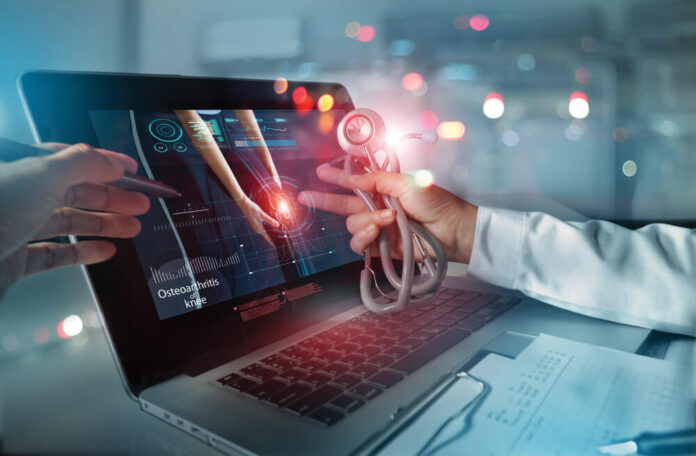Healthcare is changing fast, and technology is a big part of that change. Healthcare Software Development Services are now key in changing how we care for patients, run operations, and make decisions in healthcare.
If you have a business in this sector, then it’s important you start considering how to leverage healthcare software development to give your business an edge in the sector.
So, in this article, we will be looking at how healthcare software development is making a big difference in the healthcare world and how you can tap into that, too.
A Big Step: How Healthcare Software Has Changed
In the past, healthcare depended a lot on writing records by hand, which was slow and often wrong. Now, with healthcare software, things are changing. This software includes everything from Electronic Health Records (EHR) to telemedicine, making healthcare smoother and better organized.
Healthcare software is always getting better, meeting the changing needs of the field. Healthcare places are seeing how important it is to have software made just for them. This custom software makes things more efficient and fits perfectly with the unique ways different healthcare providers work.
Some Major Benefits of Healthcare Software
#1: Better Care for Patients
This is, no doubt, a major plus for the health sector. Healthcare software has revolutionized patient experience, hence helping to improve patient care.
Electronic Health Records (EHR) have changed how patient info is handled. With just one click, healthcare workers can see a patient’s whole medical history. This leads to quicker and more personalized care, which can be lifesaving.
This software also helps focus more on the patient. Patient portals and apps let people take part in their own healthcare. They can make appointments, see test results, and talk to their healthcare providers anytime. This helps build stronger relationships between patients and providers, leading to better health results.
#2: They Help Improve Efficiency
Efficiency is super important in healthcare, and software is a big help in achieving this. It makes things like scheduling appointments and managing supplies much easier, cutting down on extra work. This means healthcare workers can spend more time with patients, improving their experience.
The idea of “smart hospitals” is becoming more popular as healthcare goes digital. These hospitals use advanced software and IoT devices to create a network that improves patient care and efficiency. They use real-time data and predictive analytics to make things run smoother, meet patient needs better, and use resources wisely.
#3: Telemedicine Revolution
The COVID-19 pandemic made telemedicine more popular, with healthcare software being key. Telemedicine lets patients talk to healthcare professionals without having to be there in person, lowering the risk of catching diseases. It also makes healthcare more accessible, especially in places that are hard to reach.
Telemedicine isn’t just about talking to doctors. Remote patient monitoring (RPM) is another important part of it. RPM lets healthcare providers keep an eye on patients’ health from afar, allowing for quick action when needed. This can help reduce hospital visits, cut costs, and improve care, especially for people with long-term health issues.
What’s Next: Future Advances
The future of healthcare software development is really promising. Technologies like AI and IoT will make healthcare software even better and more integrated. Predictive analytics will help find diseases early, and wearable devices will monitor health in real time. These changes are set to transform healthcare in big ways.
AI, in particular, is going to be a major part of healthcare. AI-driven software can look through lots of patient data to spot patterns, predict diseases, and help in treatment decisions. Machine learning can also help healthcare workers make better choices – all resulting in improved patient outcomes and lower costs.
The Human Touch
While technology is a big part of modern healthcare, nothing can replace the human touch. Healthcare software aims to support, not replace, the human element in care. The skill, care, and personal touch of healthcare workers can’t be matched by technology. Software is there to boost their abilities, leading to better patient care.
Prioritizing Data Security
With more healthcare records going digital, keeping patient data safe is really important. Healthcare software puts a lot of focus on strong security measures to protect sensitive information. Things like encryption, access controls, and regular checks are used to keep patient data safe from breaches and cyber threats.
Data security in healthcare isn’t just about patient records – it also includes protecting medical devices and telemedicine platforms. As more devices get connected, it’s crucial to keep them safe from cyberattacks that could harm patient safety.
Using Big Data: Insights for Better Care
The huge amount of data in healthcare is a valuable resource. Big data analytics is key in research, helping to find new insights that can lead to medical breakthroughs. By looking at large sets of data, researchers can spot disease trends, check how treatments work, and find new areas for innovation.
Real-world evidence (RWE) is a growing area where healthcare software is making a big impact. RWE uses data from different sources, like electronic health records and wearables, to give a full picture of treatment results and drug effectiveness.
This info can help in making clinical decisions, developing drugs, and setting healthcare policies, leading to better patient care.
Final Note
To sum up, healthcare software development services have become crucial in modern healthcare. They improve patient care, make operations smoother, keep data safe, and drive the telemedicine revolution. As technology keeps advancing, healthcare software will play an even bigger role in shaping the future of healthcare.
















